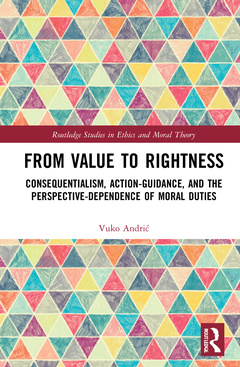From Value to Rightness Consequentialism, Action-Guidance, and the Perspective-Dependence of Moral Duties Routledge Studies in Ethics and Moral Theory Series

This book develops an original version of act-consequentialism. It argues that act-consequentialists should adopt a subjective criterion of rightness.
The book develops new arguments which strongly suggest that, according to the best version of act-consequentialism, the rightness of actions depends on expected rather than actual value. Its findings go beyond the debate about consequentialism and touch on important debates in normative ethics and metaethics. The distinction between criterion of rightness and decision procedures addresses how, why, and in which sense moral theories must be implemented by ordinary persons. The discussion of the rationales of "ought" implies "can" leads to the discovery of a hitherto overlooked moral principle, "ought" implies "evidence", which can be used to show that most prominent moral theories are false. Finally, in the context of discussing cases that are supposed to reveal intuitions that favour either objective or subjective consequentialism, the book argues that which cases are relevant for the discussion of objectivism and subjectivism depends on the type of moral theory we are concerned with (consequentialism, Kantianism, virtue ethics, etc.).
From Value to Rightness will be of interest to scholars and advanced students working in normative ethics and metaethics.
Introduction
Part I. Decision-Guidance
1 The Problem of Decision-Guidance
2 DP and Objective Consequentialism’s Travesty of Decision-Guidance
Part II: "Ought" Implies "Can"
3 In Defence of "Ought" Implies "Can"
4 Objective Consequentialism and Ignorance-Induced Inability
5 Four Arguments Against Objective Consequentialism Related to "Ought" Implies "Can"
6 "Ought" Implies "Evidence"
7 Is Subjective Consequentialism Compatible with "Ought" Implies "Can"?
Part III: Intuitions about Perspective-Dependence
8 A New Perspective on the Perspective-Dependence of Moral Duties
9 Objective Consequentialism’s Licensing Dilemma
Conclusion
Vuko Andrić is Lecturer at Bayreuth University, a researcher at the Institute for Futures Studies in Stockholm, and Feodor Lynen Research Fellow of the Alexander von Humboldt Foundation. His research focuses on consequentialism and has been published in international peer-reviewed journals such as Acta Analytica, Ethical Theory and Moral Practice, Erkenntnis, Journal of Ethics and Social Philosophy, Journal of Global Ethics, Philosophical Studies, Philosophia, Ratio, Religious Studies, Thought, and Utilitas.
Date de parution : 05-2024
15.2x22.9 cm
Date de parution : 07-2021
15.2x22.9 cm
Thèmes de From Value to Rightness :
Mots-clés :
Objective Consequentialism; Vuko Andrić; Vice Versa; consequentialism; Subjective Consequentialism; act-consequentialism; Common Sense Morality; Plausible Moral Theories; Violating; factualism; Follow; prospectivism; Decision Procedure; ought implies can; Everyday Moral Discourse; action-guidance; Normative Evidence; implementation of moral theories; Susan’s Case; Normative ethics; Uncertain Belief; Moral theories; Practical Deliberation; Kantianism; Prima Facie Duties; Act Individuation; Rightness; Tonsillectomy Patients; Deontic Status; Blameless Wrongdoing; Middle Ground Solutions; Constellation C3; Reason Implies; Non-paradigmatic Cases; Deviant Causal Chain; Surgeon’s Duty; Morally Permissible



